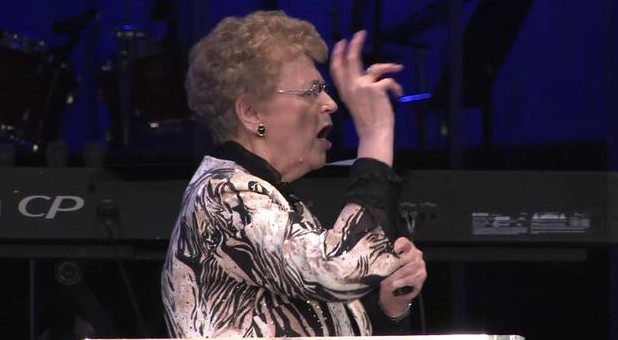Sister Peng pays a high price to be a Christian in China. She has been arrested many times, and she will go to jail again if the police catch her preaching the gospel. Forced to live as a fugitive, she must sneak into her home at night to visit her husband and young daughter.
The first time Peng was taken into custody, just after the Tienanmen Square massacre in Beijing in 1989, she was delivering a fresh shipment of Chinese Bibles to some unregistered pastors. She was thrown into a dirty detention cell and tortured with an electric cattle prod to force a confession of her “crimes.” She shivered in that cell for months. Guards offered no coats, blankets or feminine hygiene supplies.
“For eight months I had no contact with anyone. I just ate soup in my cell,” Peng told me when I visited China two years ago. “It is really God’s mercy that He fed me and kept me warm.”
Peng later was transferred to a women’s prison, where she spent two lonely years. But during that time she led 32 female inmates to Christ. Upon her release, she immediately resumed her itinerant preaching ministry.
Now 43, Peng doesn’t let her thin frame or her femininity stop her from taking on dangerous assignments. And she is not alone. She is one of the many female heroes of China’s underground church movement.
When I visited a group of unregistered church leaders in a city near Hong Kong in the year 2001, I discovered that between one-half to two-thirds of all church-planters in China today are women, most between the ages of 18 and 24. These women, along with their male colleagues, lead an estimated 25,000 people to Christ daily.
One evening after a meeting with these humble Chinese apostles, I returned to my hotel room and discovered two of the female leaders waiting at my door with a translator. “They would like you to pray for them,” the translator said.
“Are you pastors or evangelists?” I asked, hoping to better understand their needs.
They smiled and replied, “Yes.”
“How many churches do you oversee?” I inquired.
The translator pointed to the woman on the left. “This one oversees 2,000 churches, and this other one oversees 5,000 churches,” he said.
I was stunned. Some denominations in the United States are still arguing about whether a woman can stand behind a pulpit, I thought to myself. Meanwhile, women in China are engaging in dangerous missions and governing thousands of new churches. There’s something wrong with this picture!
Sister Peng is a woman on assignment, and her passion is not waning. On the last day of my visit, she shared with me her plans to take teams of Chinese Christians into the Muslim republics on the Western border of China–where she expects to encounter harsher persecution than anything she experienced under the communist police.
Her ultimate goal, she told me, is to see the Chinese church “march from China to Jerusalem until all the Muslim world hears the gospel.”
Peng added: “I used to think that missionaries going from China would not happen until after I die. But God has shown me that it will soon be time. I want to raise up 700 missionaries. It’s our time to go to the world.”
GOD NEEDS A JUNIA Since my trip to China I have met many brave women who face incredible hardships as they engage in bold apostolic ministry. Like the female apostle Junia, who served alongside the apostle Paul and was imprisoned with him (see Rom. 16:7, NKJV), these women are willing to die for Christ.
One of these modern Junias is Natasha Shedrevaya, a Russian church-planter who was recently appointed to head her Moscow-based denomination. She oversees 30 churches in Russia and another 300 churches in the former republics of the Soviet Union.
Like Peng, Natasha is a woman on a mission. Her goal is to plant a church in every village in the Siberian north–a region spanning several time zones. She is fulfilling her vision with little aid from the West and no help from the Orthodox religious establishment in her own country.
I met another modern Junia two years ago when Kayy Gordon visited my office in Florida. Kayy spent 40 years in the far north of Canada, reaching the isolated Inuit people, sometimes called Eskimos. Never married, this dedicated woman obeyed God’s call and went to live in a desolate place most men would never dare visit.
Kayy had to travel from village to village by dog sled during the first years of her difficult ministry. Later, after more workers joined her team, she lost one of her best staff members in a plane crash.
Yet even the most discouraging circumstances did not take Kayy off the front lines. At the time she retired, she had planted twelve churches and founded 12 Bible colleges. The seeds she planted in the Arctic tundra produced a spiritual awakening throughout that region.
Amazingly, when I share stories about women such as Kayy Gordon, Natasha Shedrevaya or Sister Peng, some people still object. They say, “I don’t think women can be apostles” or “God wants men to be the initiators, not women.”
You might expect such responses from men who are blinded by a chauvinistic mind-set. But I have learned that many women hold the same narrow views. They don’t think it is proper for a woman to display the apostolic courage necessary to plant churches or take nations for Christ.
How ridiculous! The Bible calls all believers–not just men–to be bold witnesses. And the Scriptures do not suggest that only men can initiate. All of us should display the kind of overcoming faith that drives us to surmount obstacles, trample on devils and challenge the status quo.
Why do so many American Christian women shy away from this apostolic challenge? I’ve identified four reasons:
1. They are too comfortable in their religious boxes. There is a religious spirit in the church that tells women they must fit a certain God-ordained “female role.” Many Christians believe that a woman is not fulfilling this role unless she stays home all day and focuses on domestic duties.
Yet the Bible does not say all women must fulfill the same role or that all women should function primarily as homemakers and caregivers. Not all women are wives and mothers, and not all are called to stay at home full time.
I have a Hispanic friend named Jackie Rodriguez who is a gifted evangelist. In December of last year, Jackie took her baby with her to southern Mexico, where she preached in several Indian villages with her son in tow.
Some women would balk at such a seemingly dangerous mission. But Jackie has decided that she cannot excuse herself from fulfilling the Great Commission just because she is nursing a baby. She lives outside the box!
Of course not all women are called to preach in foreign countries. But my question is this: Are you willing to? Have you taken all your excuses to the cross, or are you keeping God at arm’s length because you think He might ask you to go on a mission that you feel unqualified to accomplish?
2. They are paralyzed by fear. Another friend of mine, Kim Daniels, has an apostolic ministry that she began in the inner city. Earlier this year, during the conflict with Iraq, she greeted me on the telephone with excitement in her voice. “Hey, Lee, do you want to go to Iraq?” she asked.
“Right now?” I asked in amazement. “During the war?”
Kim was serious. A former soldier in the U.S. Army, she was eager to go to the front lines and minister to troops stationed in Iraq and Kuwait. During the Gulf War in 1991, Kim had led many servicemen to Jesus–and she wanted to do it again.
I was struck by Kim’s total lack of fear. Her boldness was such a contrast to the passivity and timidity I see in so many American women–many of whom stopped flying in airplanes after 9/11 because of their fear of terrorism. Though Kim did not end up going to Iraq during the war, she did minister to servicemen’s wives at a military base in Germany.
God has not called any of us to live under the control of fear, and women cannot use their gender as an excuse to be mousy or fainthearted. In fact, the apostle Peter commands women to renounce fear in order to be true daughters of Sarah (see 1 Pet. 3:6).
3. They are waiting for men to give them permission. The conservative church in the United States has conditioned women to be passive. For years we’ve told women to be quiet, stay out of church leadership and wait for men to give them instructions. Meanwhile, the Holy Spirit has been wooing women to tune out the voice of religion so they can hear His voice.
Certainly God does not need a man’s permission before He commissions a woman to do something. The Hebrew midwives, in fact, defied Pharaoh’s mandate and refused to kill the male Hebrew babies at birth as he had commanded. Deborah, the great Old Testament prophet, took her orders from God–not a man. When God announced the coming of the Messiah to Mary, He did not consult her father or her fiancé first.
And let’s remember that Jesus came to Mary Magdalene at the tomb before He appeared to his male disciples on Easter morning. If you are waiting for a man’s permission to do some form of ministry, that permission may never come.
You must obey the Lord’s voice. When you stand before the throne of judgment, don’t assume that “My husband wouldn’t let me do that” will be a permissible excuse.
4. They have not embraced the apostolic mandate. So few American Christians–men or women–have genuine zeal to see Christ’s kingdom expand to the nations. Even though Jesus told us to seek His kingdom first, missionary endeavors quickly drop to the bottom of our priority lists when we are distracted by materialism and the cares of this life.
But we must remember that even in this season of terrorist threats, SARS outbreaks and economic instability, God has not revoked the Great Commission. He has not said to us: “You don’t have to take the gospel to the nations until the threat of Muslim violence subsides.”
No, the Great Commission still stands. We must take up the challenge, swallow our fears and love not our lives “to the death” (Rev. 12:11).
Every previous generation has had brave women warriors. From the days of the early church, when women of faith were ripped to pieces by Caesar’s lions, the daughters of the church have provided a bold witness.
Where are these women of fire today? My prayer is that they will emerge in this decade with hotter zeal, deeper compassion and stronger commitment than at any other time in history.
J. Lee Grady is the former editor of Charisma and the director of The Mordecai Project (themordecaiproject.org). You can follow him on Twitter at leegrady. His latest book is Fearless Daughters of the Bible.











































